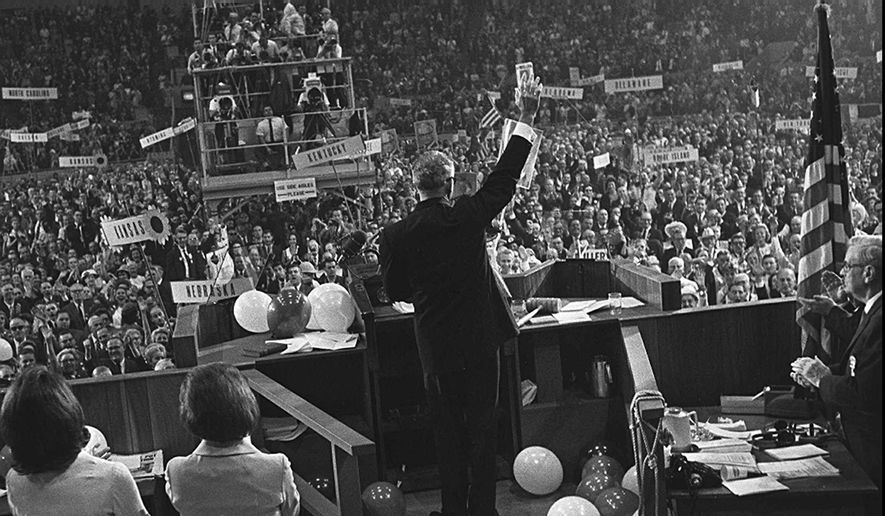OPINION:
Barry Goldwater is rightfully an icon of the American conservative movement for decades since the 1960s, and it is a privilege and an honor to contribute to his remembrance on the 50th anniversary of his presidential campaign. What many Americans may not know, however, is the role then-Sen. Goldwater played in the U.S. relations with my country, the Republic of China (ROC, Taiwan), usually termed by the senator as “Free China.” His contribution to the U.S.-Taiwan relationship made him a figure of enormous importance and won him profound respect on the other side of the Pacific as well.
Goldwater’s friendship with the ROC can be dated back to when he helped train our pilots in the U.S. as an Air Force instructor during World War II. He also flew over “The Hump” in the Himalayas to deliver supplies to the wartime ROC. His affection for my country took root then and grew even stronger when he started his political career. Ever since he won his seat in the Senate in 1952, Goldwater became one of the staunchest voices in this country advocating support for the ROC government in Taiwan against the communist regime in mainland China.
The senator strongly argued that it is a core American value and in the country’s best interest to stand by Taiwan as it faced an existential threat from tyrannical communists. But the real time to show such staunch support as a man of principle came when the United States switched diplomatic recognition from free China to Communist China in 1979 and abrogated its defense treaty with an ally as old as the ROC-Taiwan. To express his outrage, and as he felt the abrogation of a treaty required the advice and consent of the Senate while President Jimmy Carter did it single-handedly, Goldwater challenged the administration through a lawsuit against the president of the United States and argued all the way to the Supreme Court, where he ultimately failed. However, he also championed the passage of the Taiwan Relations Act (TRA), a landmark piece of legislation, which through bipartisan support, was signed into law in April 1979. To this day, that law provides the bedrock for U.S.-Taiwan relations.
This was just one of the many instances of Goldwater’s assistance to my country. Following the diplomatic switch, the ROC government was concerned that it would lose possession of Twin Oaks, a historic estate, originally built by the founder of the National Geographic Society, that had served as the residence for nine ROC ambassadors since 1937. On December 22, 1978, just ten days before the switch of recognition took effect, a civic organization co-chaired by Goldwater called the “Friends of Free China Association” purchased the Twin Oaks Estate for a token price in order to prevent it from falling into the hands of the soon-to-be recognized communist government. Also due to the senator’s help, among other things, the TRA was passed with a provision rendering legal basis for the ROC’s continued ownership of its properties. Accordingly, the Friends of Free China Association returned the property to the ROC government in 1982. Thanks to Goldwater and our other American friends, today the Twin Oaks Estate hosts many American dignitaries and the general public through events such as the annual Republic of China National Day celebration.
Over the years, Goldwater visited Taiwan on many occasions but never set his foot on mainland China. Following one such trip to Taiwan in May 1982, he issued a press release in June addressing rumors that he had been personally invited to visit mainland China. The announcement was true to the senator’s character:
“For one solid week, I have heard and read of reports that Communist China has invited me to visit Peking. I have not personally received such an invitation, and if I did, I would decline it,” Goldwater declared. “I have great affection for the Chinese people, their culture, their skills, and their potential. But until there is one free China, I will not visit the mainland.”
The legacy of Barry Goldwater as a friend and ally of the free China can be seen through acts of such a great magnitude. It can also, however, be seen through the personal touch he impressed on others. Goldwater often left people with a story or two to pass on, and I happen to have one myself.
As a junior officer for congressional liaison at the Taiwan mission in the early 1980s, I once hosted a dinner party for Goldwater’s staff at a well-known, newly-opened Chinese restaurant in downtown Washington. When the group of guests arrived, they also brought a delightful surprise: Goldwater was with them and declared himself a self-invited guest. We had a wonderful night in which the senator showed his caring and personable attitude toward us, the younger generation, as an amicable grandfather. Junior officers do not have the privilege to invite senators, but they may be bestowed upon with such an honor that will leave a long-lasting and encouraging effect throughout their career.
Goldwater consistently demonstrated the true meaning of his phonetic Chinese name, Kao-Hua-Teh: Kao, meaning “tall;” Hua, meaning “grand;” Teh, meaning “virtuous.” Tall, grand, virtuous — one for his shadow, one for his vision and one for his character.
• Lyushun Shen is the Taiwan Representative (TECRO) in the United States.




Please read our comment policy before commenting.